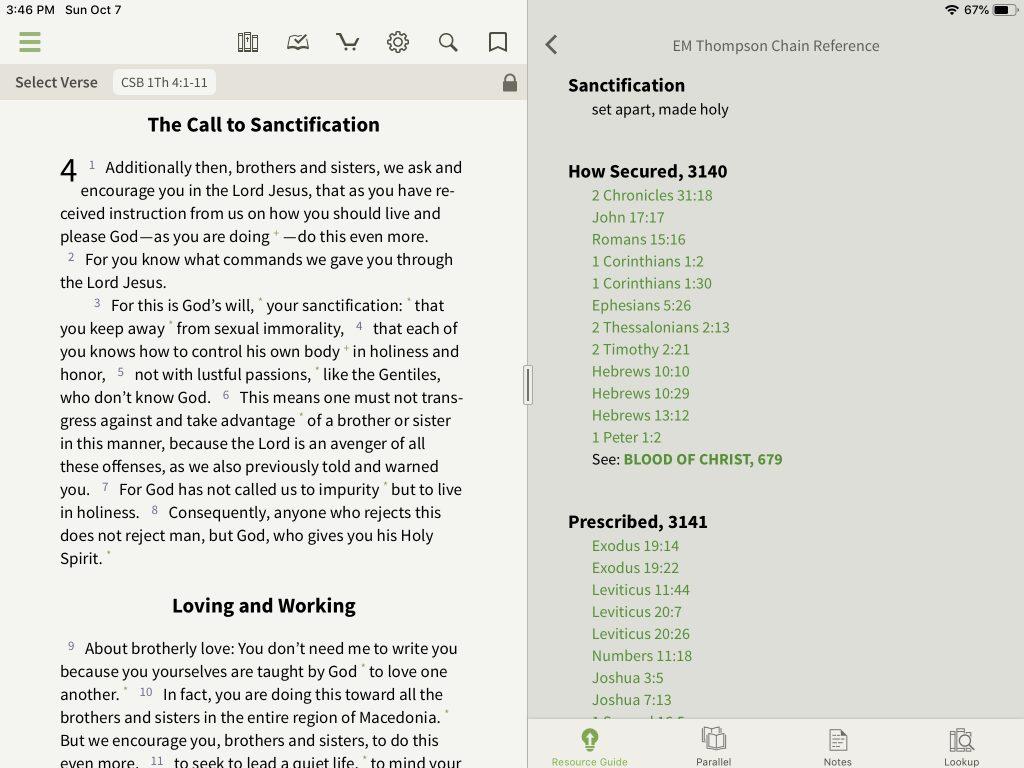The question inevitably comes up, no matter where you are. You know the question. What does the Bible say about XYZ? Depending on the topic, we may or may not have an answer. Sure, we know what the Bible teaches about salvation, but what does it teach about practical matters like fear, anxiety, or patience? How do you find the answers those questions? The best way to answer those questions is with a topical study of the Bible.
I want you to be able to answer those questions when they come your way, so that’s why I’m showing you all the steps you need to complete a topical study. In this tip you’ll learn a systematic way to learn what the Bible says on any subject. So buckle up, and let’s jump right in!
Why Do a Topical Study?
As stated in the opening, one of the main reasons why someone would want to do a topical study is so they can know what the Bible says about their given subject. But, what are some other reasons you might want to do a topical study?
The objective of a topical study is to trace a theme or subject throughout the entirety of Scripture. So, it is applicable to all walks of life. Topical studies are great for parents wanting to know how to best raise their children. They are great for churches and leadership and discussing important issues. Topical studies can even prove fruitful when sharing the gospel, as we can learn what the Bible says to combat competing worldviews.
The beauty of topical studies is they can be as simple or as detailed as we want them to be. We can study complicated & involved subjects like the doctrine of the Holy Spirit. Or, we can study something more practical like how we should handle our money according to the Bible.
Topical studies are great because they help you learn your Bible in a way that makes application easy, while also teaching you to make use of some very simple, but essential, Bible study tools.
What’s the Difference Between a Topical Study & a Word Study?
One question it took me a while to learn the answer to is this: what’s the difference between a topical study and a word study? On the surface, a topical study looks very similar to a word study. And you’re not wrong to think that way. In terms of the process and how you do the work, the two are nearly identical. But, there are some key distinctions between the two that you should know, so you don’t get them confused.
A topical study is concerned with themes and ideas. Word studies are for learning about word usage and meaning. Share on XWhat is a Word Study?
A word study is when you look at every occurrence of a word in your Bible (such as faith or love), to learn more about the word’s usage and meaning. This often involves the use of a Strong’s dictionary to find the underlying Greek and Hebrew words a given word is translated from. The focus is on individual words and their meaning, and less on concepts and ideas. With a word study, the goal is to synthesize an author or the Bible’s use of a given word.
What is a Topical Study?
In contrast, a topical study is concerned with ideas and themes as they appear in Scripture. Instead of trying to understand the meaning of a word, the objective is answering the question, “What does the Bible say about this topic?” For the most part the methods are similar, but achieve entirely different results. One major difference with a topical study is you will often study passages that do not directly reference your topic, but the topic is implied; whereas, a word study deals only with verses where the word occurs explicitly.
The key difference is this: with a word study you’re working with specific words and learning their meaning, but a topical study looks at themes and ideas in Scripture.
How to Do a Topical Study
Now that we know what a topical study is, let’s dive into the how to portion of this Bible study tip.
Step 1: Find a Topic to Study
The first step in a topical study is choosing the topic. Your topic should be drawn from your studies or a spiritual topic that is of interest to you. Maybe you’re reading through 1 Thessalonians 4 and want to learn more about the topic of sanctification. Or, maybe on a whim you become curious about what the Bible teaches on anger because it’s something you’re struggling with at the moment. There is no right or wrong way to decide on a topic, you just need to find one.
One caveat to note is that you might use contemporary language for your topic, but you will need to think about the equivalent biblical terms. For example, you might want to know what the Bible teaches about being “stressed out,” but your topical study will need to focus on words like anxiety, anxious, and worry.
A good habit to form as you study books of the Bible is to create lists of topics/subjects that are contained within each chapter. Not only will this help you better learn the information, but it gives you ideas for topical studies.
Topical studies are born from your study of books of the Bible or your own curiosity about a subject. Both avenues make for great study. Share on XStep 2: Look for Related Words & Synonyms
Once you’ve chosen your topic, the next step is finding any related words, phrases, or synonyms. Your goal in this step is to find anything that might be related to your word. Sticking with our example topic of being stressed out, we would add related words like: fear, cares, and burden.
Also consider the inclusion of antonyms for your subject, especially if it is something negative. In terms of stress, you would want to also study topics like peace and contentment as possible solutions to stress.
At this point it is possible to have a long list of words and topics to study. That’s okay. Instead of studying every single one, pick a few to focus on and use those as the foundation of your study.
Step 3: Define Your Word
This may seem like a superfluous step, but you should take time to define the terms you’re studying. Before you go further in your study, you want to make sure you have a firm grasp on the word(s) or topic(s) you’re studying. First, begin with an English dictionary. Look up your topic and make a note of its meaning. Next, you should turn to a Bible dictionary if it contains an entry for your topic, so you can also have a biblically defined definition.
Is there anything of interest in how the word is defined? If so, be sure to note that. This step can also prove to be a great place to find additional related words to include in your study.
Step 4: Find Relevant Bible Verses
With your list of words in hand, the next step in the process is finding all the related Bible verses. There are a couple key tools you can use to find these verses.
The first tool at your disposal is a concordance, preferably an exhaustive concordance. With a concordance you can look up your word and all its cognates to get a list of every relevant Bible verse. In a previous Bible study tip we cover how to use a concordance in your study, so we will refer you there.

The next tool you should consult is a tool called a topical Bible. This tool takes the Bible’s topics and themes and alphabetically organizes them into lists of relevant Bible passages. A couple popular topical Bibles would include Nave’s Topical Bible and the Thompson Chain Reference Bible. Both of these resources are invaluable and provide a wealth of Scripture references for topical study. To use them, simply look up your word or topic and then note all the listed passages.

Additionally, cross-references are another tool you will want to utilize in your topical study. As noted in a previous tip, cross-references point you to other Bible verses, many of which are related topically. Many of the cross-references will already be listed in your concordance or topical Bible, but there may be a few additional verses that get added to your list.
Concordances and topical Bibles are indispensable tools for topical studies. You can never go wrong with Nave's Topical Bible or the Thompson Chain Reference Bible. Share on XImportant Things to Note
With this step, there are a few important things to note.
First, not every reference will directly use your word or phrase. You will find both explicit and implicit references in your list of verses. Some passages will use your word directly, while others refer to the theme in general without ever using the word. For example, when studying baptism, John 3:5 and Titus 3:5 refer to baptism without explicitly stating it.
Second, not every Bible verse listed will necessarily be relevant to your topical study. Yes, the word or topic may be mentioned in the verse, but that does not mean it is applicable to understanding the topic. For instance, if you’re studying the spiritual gift of tongues, you wouldn’t need to include passages that reference tongue when talking about general speech. You only need to study passages that are relevant to your topic.
Step 5: Make Observations on Each Passage
Once you’ve taken the time to build your list of verses to study, the next step is reading through each of the passages. As you read each passage, make notes and observations about what the passage says about your topic. Are there warnings or promises that should be heeded? Does the biblical author command the reader to respond a certain way? Is your topic within a list of other topics?
Remember, never read a verse out of context. Observe what comes before and after your verse. Without understanding the proper context, you can easily derail your topical study and draw incorrect conclusions. Read with intent and understand the passage from the perspective of the original audience and how they would have understood it. Also, differentiate between passages that are descriptive (passages that describe events) versus prescriptive (teaching passages).
This step is where you unravel what Scripture says, so be diligent. Your goal is to understand what the Bible says, and nothing more. And, if you have questions, write those down too so you can find the answers, whether it be in another passage or other resources.
Step 6: Organize the Data
After you’ve completed the task of reading the text and making notes, the next step in your topical study is organizing your findings. Look at your notes and each passage. Categorize your topical study into subtopics as they revealed themselves in the text. Put all the verses together that speak positively of the topic, and put the negative verses together. As you go through this process you will build a picture of what the Bible says on your topic. Sometimes you will need to put in a little work to begin categorizing the verses; but, more often than not, the categories each verse belong in will be obvious.
The outline you build at this step should provide a solid overview of what you’ve studied.
Step 7: Summarize & Apply
You’ve chosen your topic, found the relevant Bible passages, studied them, and finally organized them. With all that complete, the only thing left to do is summarize your finding and make application.
With your outline in hand, you should be able to condense and summarize your findings into a couple sentences. At this step you should be able to say with confidence, “The Bible says ABC about topic XYZ.”
From there, you should be able to use your outline and summarization to make application from the topic. You should be able to answer questions of application like:
- How does this topic apply to the present day?
- How will my life change knowing what the Bible teaches on this topic?
- What is the application for the church?
- What will change in my prayer life after learning about this topic?
- How will this topic affect my family and those around me?
- Did my view on this topic change after this study?
- How does this topic help me understand God better?
That’s it! That’s all there is to a topical study.
What Can I Do with My Topical Study?
So, you may be asking yourself, “What can I do with a topical study once I’ve completed it?” That’s a good question and one worth asking.
The first thing we ought to do with anything we study in Scripture is internalize and apply it to ourselves. Without personal application, our studies are fruitless. We study first and foremost for ourselves and our desire to grow closer to the Lord. Anything that comes as an extension of that is a bonus.
That said, the next thing we can do with our topical study is use it as an outline to teach others. Let’s say completed a topical study on anxiety and stress, you now have in your hands an outline of what the Bible says on the topic. You can these use your subtopics as the foundation for a teaching outline. This is perfect for leading a Sunday school class, small group, or even family devotions.
Lastly, you can use the fruit of your topical study as a tool for future encouragement. For example, your struggle with patience led you to do a topical study on the subject, you now have a list of verses to reference when you find yourself becoming impatient.
Topical study notes are perfect for leading a Sunday school class, small group, or even family worship. Share on XWhat Will Be Your First Topical Study?
Now that you know the in’s & out’s of how to do a topical study, there’s only one question left to ask. What will you choose for your first topical study? Leave a comment below or send me an email. I’d love to hear about it.
Last, but not least, if you’re struggling with ideas for your topical study, be sure to click the link below to download your free list of 100 topical study ideas.
Weekly Study Prompts
This week, meditate and journal on the following passages:
- Monday – 1 Thessalonians 3-5
- Tuesday – 2 Thessalonians 1-3
- Wednesday – Acts 18:18-28; 19
- Thursday – 1 Corinthians 1-2
- Friday – 1 Corinthians 3-4
- Memory Verses: 1 Corinthians 1:18; 1 Thessalonians 5:23-24
Free Bible Study eBook
Click the button below to get a free copy of our "Bible Study Blitz" ebook that will give you 5 tips to enhance your Bible study.





